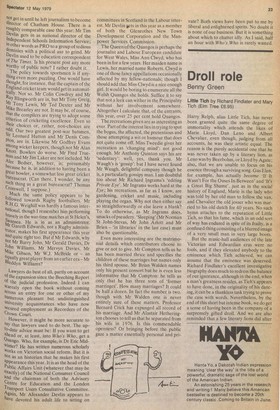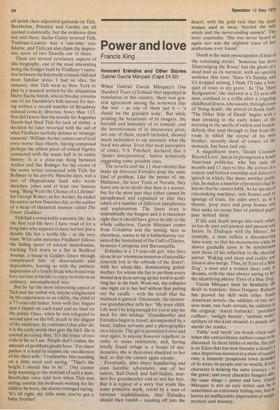Droll role
Benny Green
Little Tacit by Richard Findlater and Mary Tich (Elm Tree £6.95)
Harry Relph, alias Little Tich, has never been granted quite the same degree of immortality which attends the likes of Marie Lloyd, Dan Leno and Albert Chevalier, even though, judging from all accounts, he was their artistic equal. The reason is the purely accidental one that he was never taken up by a literary lion, as Leno was by Beerbohm, or Lloyd by Agate; also, that we are unable to focus on his essence through a surviving song. Gus Elen, for example, has actually become 'If It Wasn't For the Ouses In Between' and 'It's a Great Big Shame', just as in the social history of England, Marie is the lady who was told by her old man to follow the van, and Chevalier the old josser who was married to his old dutch for 40 years. No such hymn attaches to the reputation of Little Tich, so that his fame, which in an odd sort of way has endured in spite of its frailty, is a confused thing consisting of a blurred image of a very small man in very large boots.
But the music-hall audiences of the late Victorian and Edwardian eras were no fools, and if they elevated anybody to the eminence which Tich achieved, we can assume that the eminence was deserved. Richard Findlater's excellent investigative biography does much to redress the balance of our ignorance, although in the end, when a man's greatness resides, as Tich's appears to have done, in the originality of his dancing, it can be a thankless task trying to prove the case with words. Nevertheless, by the end of this short but intense book, we do get a sense of having been in the company of a surpremely gifted droll. And we are also reminded that a few literary lions did after all lavish their adjectival garlands on Tich. Beerbohm, Priestley and Cardus are all quoted consistently, but the evidence does not end there. Sacha Guitry revered Tich, Toulouse-Lautrec was a one-time confidante, and Tich can also claim the impressive score of two Sitwells out of three.
There are several revelatory aspects of this biography, one of the most interesting being the bridges built by Findlater's.narrafive between the lost world of music hall and more familiar areas. I had no idea, for instance, that Tich went to New York to play in a musical written by the ubiquitous Harry Bache Smith, who to this day remains one of Ira Gershwin's folk-heroes for having written a record number of Broadway musical comedy librettos, fewer than 123. Nor did I know that the noodle Sir Augustus Harris had fired Tich for lack of ability, a decision he later reversed with the aid of what Fin dlater tactfully defines as 'strategic amnesia'. William Archer comes out of it all even worse than Harris, having composed perhaps the silliest piece of critical bigotry connected with the music hall in its entire history. It is a close-run thing between Archer and Sax Rohnler for the crown of the worst writer connected with Tich, for Rohmer in his pre-Fu Manchu days, was a sort of Hippodrome hack who wrote sketches, jokes and at least one famous song, 'Bang Went the Chance of a Lifetime' for George Robey; as for Archer, he ended his career as few Ibsenites did, as the author of a heap of theatrical manure called The Green Goddess.
Tich had a remarkable romantic life: he is the first real-life hero I have read of for a long time who appears to have led not just a double life but a treble life — at the very least. With calm patience Findlater follows the fading spoor of ancient melodramas, tracking Tich down to a flat in Bedford Avenue, a house in Golders Green through complicated lists of descendants and dependants, leaving us with the pathetic impression of a lonely freak who found true love too late in his life to enjoy its fruits in an ordinary, uncomplicated way.
But by far the most interesting aspect of Tich was his verbal wit, maybe enlightened by his experiences as an oddity, the child of a 77-year-old father, born with five fingers and a thumb on each hand and no lines on the palms. Once, when he was relegated to second spot on the bill, much to the disgust of the audience, he ruminated that after all, it is the early worm that gets the bird. He is quoted as saying that, 'It's the lesser of two evils to be as I am. People don't realise the amount of problems giants have.' For sheer pathos it is hard to surpass the recollection of his third wife: 'I remember him standing on a little stool and saying, "That's the height I should like to be".' One cannot help warming to the stoicism of such a man. Beerbohm once told how when Tich was sitting outside his bedroom waiting for his child to be born, the doctor emerged saying, 'It's all right, my little man, you've got a baby brother'.



































 Previous page
Previous page